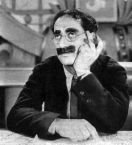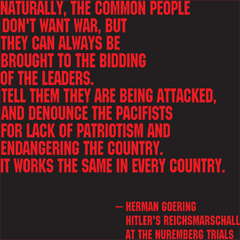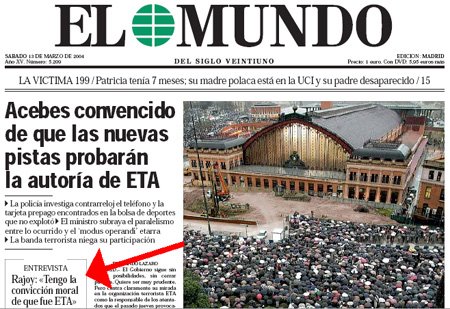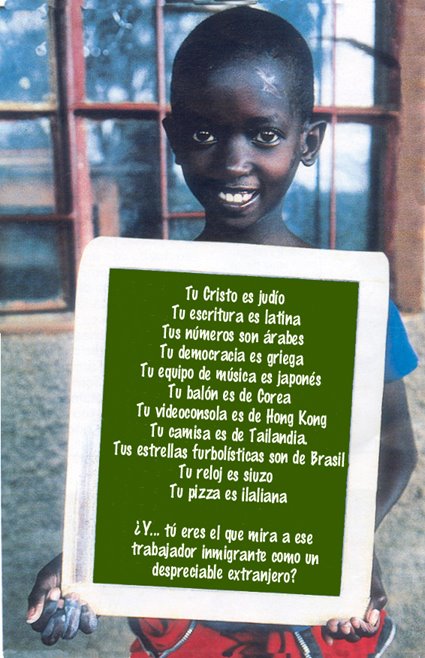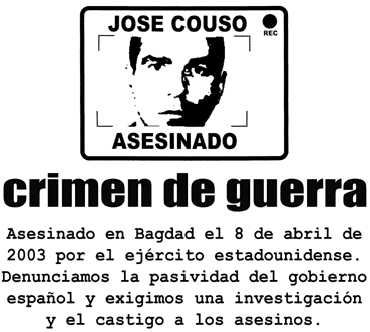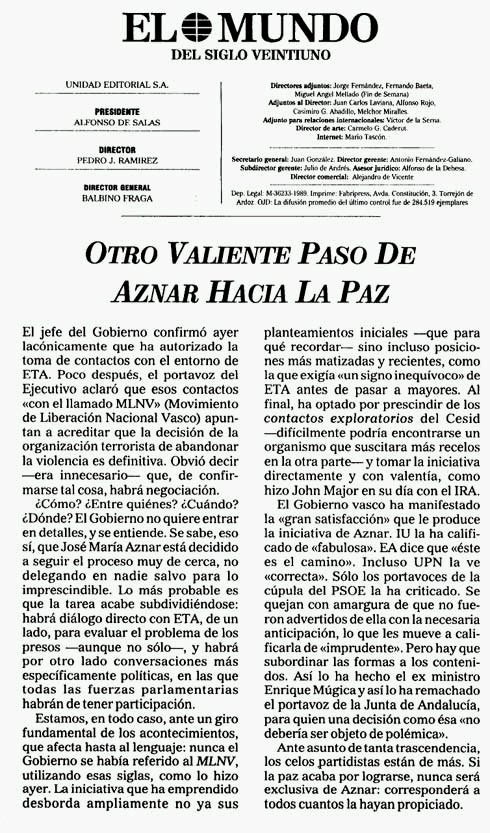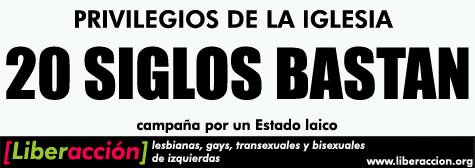
In the aftermath of the Madrid bombings, the election in Spain changed the European dynamic in the war on terror.
By Norman Birnbaum
March 16, 2004 The shattering defeat of the conservative Spanish government by the Socialist Party, with its promise to withdraw Spanish troops from Iraq and end Spanish support for the Bush doctrine, was a striking sequel to the terrible act of terror that struck Madrid. What happened at the polls on Sunday in Spain, however, can only be understood by retracing a half-century of Spanish history.
Generalissimo Francisco Franco, victor in the 1936-39 Spanish Civil War (with a great deal of help from his allies Hitler and Mussolini), was a survivor. He abandoned his German and Italian friends as the fortunes of war turned against them, and he lived on as head of an authoritarian regime until his death in 1975. His regime was near collapse in 1959, but was saved by cash and support from the Eisenhower administration. The generalissimo may have garroted and jailed the opposition, clubbed strikers and kept women in medieval legal bondage, but he was, after all, reliably anticommunist. He offered the U.S. airports and ports to defend the Christian West.
By the time Franco died, Spain had dramatically changed. For its younger citizens, Che Guevara and Robert F. Kennedy were heroes. The young women who earlier were confined to convent schools went to universities in miniskirts. The aging dictator was seen as an unlovable patriarch whose time had come and gone. The church, meanwhile, was led by the great Vatican II cardinal, Tarracon. After one of Franco's speeches about increases in prosperity the cardinal said, "Spain has produced more of everything except justice." I asked a Spanish friend what it was like in 1975 as Franco lay dying. He said, "All you need to know is that in the entire country, there was not a bottle of champagne to be had in the stores."
The transition to parliamentary democracy was remarkably quick. The younger and middle-aged elites of the old regime recognized that Spain could not be deemed European unless and until it cast off fascism. In February of 1981, the irreducible fascists in the army seized Parliament and attempted a coup. After initial hesitation, the king put himself at the head of the nation and ordered the generals back to their armories. The coup was denounced at once by the European governments. (English Prime Minister Margaret Thatcher was especially firm.) The U.S. secretary of state, Alexander Haig, said that it was an internal Spanish matter on which he would not comment. U.S. forces in Spain had been confined to their bases that day, before the seizure of Parliament. Many Spaniards wondered on which side the U.S. had been so neutral.
Democratization continued. Many exiles had returned, and Spanish culture marvelously came to life (think of the films of Pedro Almodóvar and the novels of Manuel Vazquez Montalbán). The country achieved in a decade what took the Western Europeans a generation. They learned to live on the edge of the modern age. In 1982, the great party of the Spanish Republic, the Socialists, won the election under Felipe Gonzalez. The Socialists instituted a Spanish welfare state like the other European countries, but their main achievement was to consolidate the cultural Europeanization and democratic ethos that make Spain a vital modern nation. There were plenty of problems: A segment of the Basque movement that had been so active against Franco demanded total independence, and used terror. The Socialists employed repellent methods against them, death squads, which eventually came to light to undermine the Socialists' moral credentials. There was, too, corruption among Socialist officials, and a series of very public scandals. It is to Spain's credit that the scandals were public, but they certainly dampened the exaltation of the first decade of freedom.
In 1996, Jose Maria Aznar became prime minister as head of the Popular Party. The party was, as most modern parties are, a coalition. It included older elements distinctly nostalgic for the black-and-white (mostly black) days of Franco, liberal Christian Democrats and followers of Opus Dei (the half-secret conservative Catholic movement), high finance, entrepreneurs and technocrats. Its voters were drawn from the vastly enlarged urban middle class. Educated thanks to the Socialist expansion of higher education, their aging parents taken care of by the new social security system, they forsook the party that had made their prosperity possible. The Popular Party was very much in the tradition of the Spanish right; it insisted on a centralized Spain, sought to limit the federalism written into the constitution, and refused any negotiation at all with the Basque movement. Indeed, it treated the moderate Basque Party as no better than the independence movement -- and so undercut the chance for a peaceful compromise. Economically, the Popular Party launched a speculative boom visible in ever more housing construction at ever higher prices -- and a stock market surge.
The Socialists in 2000 warned that the government's failure to make long-term social investments -- in education, health services and research -- would cost Spain dearly. They were right, but their own project floundered. Their internal conflicts, serial changes in the leadership, and inability to find a suitable successor for Gonzalez led to a loss of energy and support among the unions, the young and the educated. Their electorate gradually receded to the groups most in need of social protection: the elderly and the poor. The continuing support of the critical intelligentsia hardly made up for losses in the larger cities.
Aznar won again, and with an absolute majority, which went to his head. He became increasingly contemptuous of the opposition, of his critics in the media, and of civil society. When in 2002 the oil tanker Prestige foundered off the Atlantic Coast in a gigantic ecological disaster, the government refused to accept responsibility for its incompetent management. Aznar's policies in education (a return to obligatory religious instruction, at the limits of constitutional legality), immigration (grudging where not xenophobic), and the economy (systematic deregulation) moved from liberal Christian democracy toward a fundamentalism of the right. He shocked many Spanish sensibilities by using L'Escorial, Phillip the Second's monument to himself, to stage the wedding of his daughter (complete with his friend, the Italian prime minister and conservative vulgarian Silvio Berlusconi in striped pants and a visibly pained royal family as guests.) Spain is a country of old social distinctions with a sense that these ancient inhibitions have outlived their usefulness. Many in the public thought they detected in their prime minister the soul of a parvenu.
Certainly there was something frenetic about Aznar's enlistment of Spain in the "war on terror" and the invasion of Iraq. He had a major role in obtaining the signatures of Tony Blair and Berlusconi for the letter of loyalty to the U.S. drafted by an obliging CIA agent -- a letter that enraged French Prime Minister Chirac and German Chancellor Schroeder and marked a large success for the Bush White House. Europe had been split.
Aznar refused parliamentary debates on the veracity of the claim that Iraq had weapons of mass destruction, denounced his critics as disloyal to the West and to Spain. His U.N. ambassador and his foreign minister read from a Bush script with dogmatic certainty. When on Feb. 15 last year over a million citizens took to Madrid's streets to join the worldwide protest, there was one episode of violence. As the police encircled the protagonists, they were instructed by the Interior Ministry to let them go -- they were, obviously, provocateurs. Aznar's visits to the Bush ranch and the White House, his speech before the Congress (or rather, before congressional staff), meanwhile increased his sense of self-importance. Aznar believed that he had made Spain, through the Bush connection, a major world power. The fact is, he separated his nation from its erstwhile European allies and evoked the suspicions of the Latin American nations. He also threw away, with astonishing casualness, Spain's legacy of close relations with the Muslim nations.
Aznar is, clearly, not devoid of a political sixth sense. Something told him not to run again, and he turned over the party to the more conciliatory figure of Mariano Rajoy. But the arrogance of Aznar and some of his ministers disfigured the campaign. The state TV channel was about as objective as Fox News: The journalists working there made their discontent known.
The Socialist campaign was doggedly consistent. Party leader Jose Luis Rodriguez Zapatero stuck to three themes. Spanish troops would be withdrawn from Iraq and the nation returned to a European foreign policy with a renewal of its close ties to France and Germany. Eleven percent unemployment and underinvestment in the future would be attacked by a comprehensive program of social investment. An open style of governance would be his method of conducting public business. Zapatero was intelligent, conciliatory and focused.
Like many others, I wondered if he had the necessary aggression to be a leader. Zapatero, the youngest member of Parliament when elected at age 26, was the protégé of Felipe Gonzalez. Clearly, the old master knew what he had. Zapatero dismayed many of his own partisans and the entire left when he said he would not claim the prime ministership if he did not attain more votes than the government's candidate.
By the middle of last week, the game seemed over. The polls suggested that the government would lose its absolute majority, but still win the election (the figures gave it around 41 percent and the Socialists 36 or 37 percent). Aznar, too, knew what he had when he named the gentlemanly Rajoy his successor: He was distinctly less threatening and irritating than Aznar himself. The Socialists (I talked with a number of persons who will now be ministers) were resigning themselves to another four years of opposition. The government's left and liberal critics in the media were hopeful that Rajoy would change the atmosphere, which they found detestable under Aznar. His hints and his own turns of phrase even led to hope that he would deemphasize the Bush alliance and move again toward Europe.
Then the catastrophe intervened, early in the morning of Thursday, March 11. Commuter trains filled with ordinary persons -- those who, in fact, had no cars with which to drive to work, namely immigrants, workers and students -- were blown up. As Madrid fell into chaos, the government announced that the culprits were the Basque separatist group ETA. Aznar himself telephoned the major newspapers to insist that the government knew this for a fact -- twice he called El Pais, the nation's most prestigious paper and one rather critical of him. The foreign minister instructed the ambassadors to tell foreign governments that this was what the government knew.
However, a vigilant citizen near one of the stations from which the trains had come noticed a van parked by men who were wearing ski masks on a mild March day. It was in the van that the police found detonators as well as a Quranic tape. A telephone in a backpack that contained unexploded bombs provided more clues. As millions took to the streets to protest on Friday, the intelligence agencies were already closing in on Islamist suspects. The government repeated the ETA story -- despite an ETA denial. The public officials involved spoke to Cadena Ser, the radio station owned by the El Pais group. Cadena Ser broke the story, evoking a great deal of abuse from the official media and the sobriquet "wretched" ("miserables") from the interior minister. The minister spent much of Friday and all of Saturday repudiating his earlier pronouncements.
Saturday, the day before the election, is by law a day of reflection -- without campaigning of any kind. Mobilizing by cellular phone, thousands gathered in front of the Popular Party's offices. The first hundreds who came were told by the police to leave and were asked for their identity cards. The crowd grew and the police formed a cordon around the building and did nothing. The crowd's slogans were clear: "We will not vote until we know the truth" and, more to the point, "Your war, our deaths." This was the taunt directed at both Aznar and Rajoy when they voted in Madrid the next morning. There were demonstrations of the same kind in front of the PP's offices in every major city. In the election, participation was 8 percent greater than four years ago. The additional voters were first-time voters and former Socialist voters who had abstained in recent elections or had moved to the Popular Party.
In the final tally, the Socialists increased their share of the vote from 34 percent in 2000 to 42 percent in 2004; the Popular Party decreased from 44 to 37. The Socialists gained 39 seats, and are 12 short of an absolute majority; the Popular Party lost 35. The Socialists actually gained 3 million votes, the Popular Party lost 700,000. Zapatero has the authority of the largest vote total ever recorded in democratic Spain.
Clearly, the Popular Party rightly feared that attention to an Islamist attack would remind the public of its responsibility for war on the side of the United States. Its subsequent attempts at deception were politically suicidal -- the work of leaders in the grip of panic. It enraged many in the public, recalled the government's arrogance in the recent past, and offended a populace that had good reason in familial memory to take democracy seriously. The distrust of the Popular Party, heightened by its response to the bombing, also reminded the citizens of their other grievances, economic and social. Zapatero's straightforwardness, originally depicted as boring, now became attractive.
Zapatero will be dependent upon votes from the smaller formations for his parliamentary majorities, but there is little doubt that he will obtain these. In his first press conference, he declared that the Spanish troops would indeed leave Iraq unless the provisional authority was replaced by a U.N. authority and Iraqi self-rule. He declared that Spanish foreign policy will now have three central points. One is to be a revival of the European connection, strengthening of the European Union and the European social model. The second is Spain's special relationship to Latin America, where the president of Argentina has already expressed his delight at the Socialist victory. The third is the United Nations as a framework for relations between the developed and impoverished worlds. (Presumably, Spain's U.N. ambassador, who was on Fox TV on Sunday evening pronouncing the election a triumph for terrorism, will be moving on. I rather like the old gentleman: He reminds me in dress and manner of an oblivious actor successfully playing the part of an official of the Franco regime, who hasn't been told Franco has died.)
The obstacles in the Socialists' path are many. The presumed responsibility of the Islamists for the attack may increase tensions, which are already considerable, between the Spanish population and the large numbers of Muslims living legally and illegally in Spain. Zapatero's break with the "coalition of the willing" is sure to excite Bush's retaliation, direct and indirect, open and covert. Nevertheless, Zapatero has had the courage to proclaim the break. At his press conference, he remarked that Blair and Bush were wrong about Iraq and he invited them to engage in self-criticism. His courage and determination align him with France and Germany and leave Berlusconi, already in serious difficulty on many fronts, exposed to still more domestic criticism.
George W. Bush, Condoleezza Rice and their servants in the American media have shown a curious view of democracy, never ceasing to praise the "courage" of foreign leaders who obey not their own electorates but the White House. Perhaps this display of Spanish independence will contribute to the education of the American public, which has been told to believe that other nations are to be taken seriously only when they are appendages of Bush's policies. In his campaign, Zapatero openly expressed the belief that the world would be better off with a President Kerry in office. Clearly, U.S. interference in the affairs of other nations has now generated the sort of reciprocity that Americans will have to learn to live with.
Back to Spain. William Faulkner remarked that in his native South the past wasn't over: "In fact, it isn't even past." Spain, too, is a society with an enormous amount of historical memory. The Popular Party is not a gang of fascists. However, its hypernationalist ideology, its authoritarianism, and its self-righteous lying were nonetheless unpleasant reminders of the past. People were reminded that Aznar's grandfather had a very successful career under Franco. Zapatero's was an officer in the Republican army, executed after being taken prisoner. When the crowds gathered in Madrid on Friday, there were two main chants. One was "Spain, united, will never be defeated." The other was, "The people, united, will never be defeated." The two Spains of 1936 seem still to be there.
Zapatero has said that he wants to be prime minister for all, and in a gracious concession speech, Rajoy promised to work with him in the national interest. Perhaps it has taken the impact of terror to open this as a possibility. But the election has already changed Spain and the dynamic in Europe, and given Americans reason to reflect on their possibilities.
- - - - - - - - - - - -
About the writerNorman Birnbaum is professor emeritus at the Georgetown University Law Center. His most recent book, "After Progress, American Social Reform and European Socialism in The Twentieth Century," is an Oxford University Press paperback. He has just returned from Spain.
By Norman Birnbaum
March 16, 2004 The shattering defeat of the conservative Spanish government by the Socialist Party, with its promise to withdraw Spanish troops from Iraq and end Spanish support for the Bush doctrine, was a striking sequel to the terrible act of terror that struck Madrid. What happened at the polls on Sunday in Spain, however, can only be understood by retracing a half-century of Spanish history.
Generalissimo Francisco Franco, victor in the 1936-39 Spanish Civil War (with a great deal of help from his allies Hitler and Mussolini), was a survivor. He abandoned his German and Italian friends as the fortunes of war turned against them, and he lived on as head of an authoritarian regime until his death in 1975. His regime was near collapse in 1959, but was saved by cash and support from the Eisenhower administration. The generalissimo may have garroted and jailed the opposition, clubbed strikers and kept women in medieval legal bondage, but he was, after all, reliably anticommunist. He offered the U.S. airports and ports to defend the Christian West.
By the time Franco died, Spain had dramatically changed. For its younger citizens, Che Guevara and Robert F. Kennedy were heroes. The young women who earlier were confined to convent schools went to universities in miniskirts. The aging dictator was seen as an unlovable patriarch whose time had come and gone. The church, meanwhile, was led by the great Vatican II cardinal, Tarracon. After one of Franco's speeches about increases in prosperity the cardinal said, "Spain has produced more of everything except justice." I asked a Spanish friend what it was like in 1975 as Franco lay dying. He said, "All you need to know is that in the entire country, there was not a bottle of champagne to be had in the stores."
The transition to parliamentary democracy was remarkably quick. The younger and middle-aged elites of the old regime recognized that Spain could not be deemed European unless and until it cast off fascism. In February of 1981, the irreducible fascists in the army seized Parliament and attempted a coup. After initial hesitation, the king put himself at the head of the nation and ordered the generals back to their armories. The coup was denounced at once by the European governments. (English Prime Minister Margaret Thatcher was especially firm.) The U.S. secretary of state, Alexander Haig, said that it was an internal Spanish matter on which he would not comment. U.S. forces in Spain had been confined to their bases that day, before the seizure of Parliament. Many Spaniards wondered on which side the U.S. had been so neutral.
Democratization continued. Many exiles had returned, and Spanish culture marvelously came to life (think of the films of Pedro Almodóvar and the novels of Manuel Vazquez Montalbán). The country achieved in a decade what took the Western Europeans a generation. They learned to live on the edge of the modern age. In 1982, the great party of the Spanish Republic, the Socialists, won the election under Felipe Gonzalez. The Socialists instituted a Spanish welfare state like the other European countries, but their main achievement was to consolidate the cultural Europeanization and democratic ethos that make Spain a vital modern nation. There were plenty of problems: A segment of the Basque movement that had been so active against Franco demanded total independence, and used terror. The Socialists employed repellent methods against them, death squads, which eventually came to light to undermine the Socialists' moral credentials. There was, too, corruption among Socialist officials, and a series of very public scandals. It is to Spain's credit that the scandals were public, but they certainly dampened the exaltation of the first decade of freedom.
In 1996, Jose Maria Aznar became prime minister as head of the Popular Party. The party was, as most modern parties are, a coalition. It included older elements distinctly nostalgic for the black-and-white (mostly black) days of Franco, liberal Christian Democrats and followers of Opus Dei (the half-secret conservative Catholic movement), high finance, entrepreneurs and technocrats. Its voters were drawn from the vastly enlarged urban middle class. Educated thanks to the Socialist expansion of higher education, their aging parents taken care of by the new social security system, they forsook the party that had made their prosperity possible. The Popular Party was very much in the tradition of the Spanish right; it insisted on a centralized Spain, sought to limit the federalism written into the constitution, and refused any negotiation at all with the Basque movement. Indeed, it treated the moderate Basque Party as no better than the independence movement -- and so undercut the chance for a peaceful compromise. Economically, the Popular Party launched a speculative boom visible in ever more housing construction at ever higher prices -- and a stock market surge.
The Socialists in 2000 warned that the government's failure to make long-term social investments -- in education, health services and research -- would cost Spain dearly. They were right, but their own project floundered. Their internal conflicts, serial changes in the leadership, and inability to find a suitable successor for Gonzalez led to a loss of energy and support among the unions, the young and the educated. Their electorate gradually receded to the groups most in need of social protection: the elderly and the poor. The continuing support of the critical intelligentsia hardly made up for losses in the larger cities.
Aznar won again, and with an absolute majority, which went to his head. He became increasingly contemptuous of the opposition, of his critics in the media, and of civil society. When in 2002 the oil tanker Prestige foundered off the Atlantic Coast in a gigantic ecological disaster, the government refused to accept responsibility for its incompetent management. Aznar's policies in education (a return to obligatory religious instruction, at the limits of constitutional legality), immigration (grudging where not xenophobic), and the economy (systematic deregulation) moved from liberal Christian democracy toward a fundamentalism of the right. He shocked many Spanish sensibilities by using L'Escorial, Phillip the Second's monument to himself, to stage the wedding of his daughter (complete with his friend, the Italian prime minister and conservative vulgarian Silvio Berlusconi in striped pants and a visibly pained royal family as guests.) Spain is a country of old social distinctions with a sense that these ancient inhibitions have outlived their usefulness. Many in the public thought they detected in their prime minister the soul of a parvenu.
Certainly there was something frenetic about Aznar's enlistment of Spain in the "war on terror" and the invasion of Iraq. He had a major role in obtaining the signatures of Tony Blair and Berlusconi for the letter of loyalty to the U.S. drafted by an obliging CIA agent -- a letter that enraged French Prime Minister Chirac and German Chancellor Schroeder and marked a large success for the Bush White House. Europe had been split.
Aznar refused parliamentary debates on the veracity of the claim that Iraq had weapons of mass destruction, denounced his critics as disloyal to the West and to Spain. His U.N. ambassador and his foreign minister read from a Bush script with dogmatic certainty. When on Feb. 15 last year over a million citizens took to Madrid's streets to join the worldwide protest, there was one episode of violence. As the police encircled the protagonists, they were instructed by the Interior Ministry to let them go -- they were, obviously, provocateurs. Aznar's visits to the Bush ranch and the White House, his speech before the Congress (or rather, before congressional staff), meanwhile increased his sense of self-importance. Aznar believed that he had made Spain, through the Bush connection, a major world power. The fact is, he separated his nation from its erstwhile European allies and evoked the suspicions of the Latin American nations. He also threw away, with astonishing casualness, Spain's legacy of close relations with the Muslim nations.
Aznar is, clearly, not devoid of a political sixth sense. Something told him not to run again, and he turned over the party to the more conciliatory figure of Mariano Rajoy. But the arrogance of Aznar and some of his ministers disfigured the campaign. The state TV channel was about as objective as Fox News: The journalists working there made their discontent known.
The Socialist campaign was doggedly consistent. Party leader Jose Luis Rodriguez Zapatero stuck to three themes. Spanish troops would be withdrawn from Iraq and the nation returned to a European foreign policy with a renewal of its close ties to France and Germany. Eleven percent unemployment and underinvestment in the future would be attacked by a comprehensive program of social investment. An open style of governance would be his method of conducting public business. Zapatero was intelligent, conciliatory and focused.
Like many others, I wondered if he had the necessary aggression to be a leader. Zapatero, the youngest member of Parliament when elected at age 26, was the protégé of Felipe Gonzalez. Clearly, the old master knew what he had. Zapatero dismayed many of his own partisans and the entire left when he said he would not claim the prime ministership if he did not attain more votes than the government's candidate.
By the middle of last week, the game seemed over. The polls suggested that the government would lose its absolute majority, but still win the election (the figures gave it around 41 percent and the Socialists 36 or 37 percent). Aznar, too, knew what he had when he named the gentlemanly Rajoy his successor: He was distinctly less threatening and irritating than Aznar himself. The Socialists (I talked with a number of persons who will now be ministers) were resigning themselves to another four years of opposition. The government's left and liberal critics in the media were hopeful that Rajoy would change the atmosphere, which they found detestable under Aznar. His hints and his own turns of phrase even led to hope that he would deemphasize the Bush alliance and move again toward Europe.
Then the catastrophe intervened, early in the morning of Thursday, March 11. Commuter trains filled with ordinary persons -- those who, in fact, had no cars with which to drive to work, namely immigrants, workers and students -- were blown up. As Madrid fell into chaos, the government announced that the culprits were the Basque separatist group ETA. Aznar himself telephoned the major newspapers to insist that the government knew this for a fact -- twice he called El Pais, the nation's most prestigious paper and one rather critical of him. The foreign minister instructed the ambassadors to tell foreign governments that this was what the government knew.
However, a vigilant citizen near one of the stations from which the trains had come noticed a van parked by men who were wearing ski masks on a mild March day. It was in the van that the police found detonators as well as a Quranic tape. A telephone in a backpack that contained unexploded bombs provided more clues. As millions took to the streets to protest on Friday, the intelligence agencies were already closing in on Islamist suspects. The government repeated the ETA story -- despite an ETA denial. The public officials involved spoke to Cadena Ser, the radio station owned by the El Pais group. Cadena Ser broke the story, evoking a great deal of abuse from the official media and the sobriquet "wretched" ("miserables") from the interior minister. The minister spent much of Friday and all of Saturday repudiating his earlier pronouncements.
Saturday, the day before the election, is by law a day of reflection -- without campaigning of any kind. Mobilizing by cellular phone, thousands gathered in front of the Popular Party's offices. The first hundreds who came were told by the police to leave and were asked for their identity cards. The crowd grew and the police formed a cordon around the building and did nothing. The crowd's slogans were clear: "We will not vote until we know the truth" and, more to the point, "Your war, our deaths." This was the taunt directed at both Aznar and Rajoy when they voted in Madrid the next morning. There were demonstrations of the same kind in front of the PP's offices in every major city. In the election, participation was 8 percent greater than four years ago. The additional voters were first-time voters and former Socialist voters who had abstained in recent elections or had moved to the Popular Party.
In the final tally, the Socialists increased their share of the vote from 34 percent in 2000 to 42 percent in 2004; the Popular Party decreased from 44 to 37. The Socialists gained 39 seats, and are 12 short of an absolute majority; the Popular Party lost 35. The Socialists actually gained 3 million votes, the Popular Party lost 700,000. Zapatero has the authority of the largest vote total ever recorded in democratic Spain.
Clearly, the Popular Party rightly feared that attention to an Islamist attack would remind the public of its responsibility for war on the side of the United States. Its subsequent attempts at deception were politically suicidal -- the work of leaders in the grip of panic. It enraged many in the public, recalled the government's arrogance in the recent past, and offended a populace that had good reason in familial memory to take democracy seriously. The distrust of the Popular Party, heightened by its response to the bombing, also reminded the citizens of their other grievances, economic and social. Zapatero's straightforwardness, originally depicted as boring, now became attractive.
Zapatero will be dependent upon votes from the smaller formations for his parliamentary majorities, but there is little doubt that he will obtain these. In his first press conference, he declared that the Spanish troops would indeed leave Iraq unless the provisional authority was replaced by a U.N. authority and Iraqi self-rule. He declared that Spanish foreign policy will now have three central points. One is to be a revival of the European connection, strengthening of the European Union and the European social model. The second is Spain's special relationship to Latin America, where the president of Argentina has already expressed his delight at the Socialist victory. The third is the United Nations as a framework for relations between the developed and impoverished worlds. (Presumably, Spain's U.N. ambassador, who was on Fox TV on Sunday evening pronouncing the election a triumph for terrorism, will be moving on. I rather like the old gentleman: He reminds me in dress and manner of an oblivious actor successfully playing the part of an official of the Franco regime, who hasn't been told Franco has died.)
The obstacles in the Socialists' path are many. The presumed responsibility of the Islamists for the attack may increase tensions, which are already considerable, between the Spanish population and the large numbers of Muslims living legally and illegally in Spain. Zapatero's break with the "coalition of the willing" is sure to excite Bush's retaliation, direct and indirect, open and covert. Nevertheless, Zapatero has had the courage to proclaim the break. At his press conference, he remarked that Blair and Bush were wrong about Iraq and he invited them to engage in self-criticism. His courage and determination align him with France and Germany and leave Berlusconi, already in serious difficulty on many fronts, exposed to still more domestic criticism.
George W. Bush, Condoleezza Rice and their servants in the American media have shown a curious view of democracy, never ceasing to praise the "courage" of foreign leaders who obey not their own electorates but the White House. Perhaps this display of Spanish independence will contribute to the education of the American public, which has been told to believe that other nations are to be taken seriously only when they are appendages of Bush's policies. In his campaign, Zapatero openly expressed the belief that the world would be better off with a President Kerry in office. Clearly, U.S. interference in the affairs of other nations has now generated the sort of reciprocity that Americans will have to learn to live with.
Back to Spain. William Faulkner remarked that in his native South the past wasn't over: "In fact, it isn't even past." Spain, too, is a society with an enormous amount of historical memory. The Popular Party is not a gang of fascists. However, its hypernationalist ideology, its authoritarianism, and its self-righteous lying were nonetheless unpleasant reminders of the past. People were reminded that Aznar's grandfather had a very successful career under Franco. Zapatero's was an officer in the Republican army, executed after being taken prisoner. When the crowds gathered in Madrid on Friday, there were two main chants. One was "Spain, united, will never be defeated." The other was, "The people, united, will never be defeated." The two Spains of 1936 seem still to be there.
Zapatero has said that he wants to be prime minister for all, and in a gracious concession speech, Rajoy promised to work with him in the national interest. Perhaps it has taken the impact of terror to open this as a possibility. But the election has already changed Spain and the dynamic in Europe, and given Americans reason to reflect on their possibilities.
- - - - - - - - - - - -
About the writerNorman Birnbaum is professor emeritus at the Georgetown University Law Center. His most recent book, "After Progress, American Social Reform and European Socialism in The Twentieth Century," is an Oxford University Press paperback. He has just returned from Spain.

